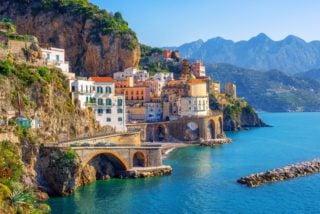
Discover How to Get a Work Visa in Italy
 Italy is known for its excellent work-life balance, affordable cost of living, and vibrant culture, making it a popular destination for people worldwide. However, unless you're retiring or living off savings, you will likely need to apply for a work visa to fully enjoy "la dolce vita fully." There are several Italy work visa options, and since the requirements can vary depending on your nationality, it’s essential to understand the specific immigration rules that apply to you.
Italy is known for its excellent work-life balance, affordable cost of living, and vibrant culture, making it a popular destination for people worldwide. However, unless you're retiring or living off savings, you will likely need to apply for a work visa to fully enjoy "la dolce vita fully." There are several Italy work visa options, and since the requirements can vary depending on your nationality, it’s essential to understand the specific immigration rules that apply to you.
To ensure you apply for the right visa, it’s important to start planning early. This guide will walk you through the different types of visas available, the application process, associated costs, and other important factors to help you navigate your relocation with confidence.
Italy is known for its excellent work-life balance, affordable cost of living, and vibrant culture, making it a popular destination for people worldwide. However, unless you're retiring or living off savings, you will likely need to apply for a work visa to fully enjoy "la dolce vita fully." There are several Italy work visa options, and since the requirements can vary depending on your nationality, it’s essential to understand the specific immigration rules that apply to you.
To ensure you apply for the right visa, it’s important to start planning early. This guide will walk you through the different types of visas available, the application process, associated costs, and other important factors to help you navigate your relocation with confidence.
Can Foreigners Work in Italy?
Foreigners can work in Italy, but your nationality will affect how easy it is to get a work visa. If you're from the EU or EEA, the process is straightforward, but non-EU citizens will need to apply for a specific work visa. Here's what you need to know:
EU Citizens
If you're from the EU, Switzerland, or the European Economic Area (EEA), you do not need a work visa to live and work in Italy. As an EU citizen, you have the right to move freely between member countries for both work and residence.
However, while a work permit is not required, it’s still important to review how taxes, social security, and other legal matters are handled between Italy and your home country to ensure everything is in order.

Find the Best International Insurance
- Compare multiple quotes and coverage options
- Work with an insurance expert at no additional cost
- Find the best plan for your needs and budget
Non-EU Citizens
Italy is known for having one of the most open and flexible immigration policies in Europe, even for non-EU citizens. The government offers several types of work visas for different sectors, including everything from startups to seasonal jobs.
However, it’s important to understand that an Italian work visa only permits you to enter the country for employment purposes. It does not automatically grant long-term residency. Therefore, if you plan to stay in Italy for an extended period, you will also need to apply for a residence permit (Permesso di Soggiorno).
Read More: The Best Jobs in Italy for Expats
Types of Italian Work Visas
If you plan to live and work in Italy for more than 90 days, you’ll need to apply for an Italian work visa. This is classified as a national visa, also known as a D-Visa. This visa allows you to stay in Italy for an extended period and is typically required for most foreign nationals who wish to work there.
Below is an overview of the different types of work visas available in Italy:
Salaried Employment Visa
This visa is for foreign nationals who have received a job offer from an Italian employer. The employer will first apply for an Italian work permit on your behalf.
Once the work permit is approved, you can apply for a salaried employment visa. This will grant you the legal right to live and work in Italy under the terms of your employment.
Self-Employment Visa
Italy’s self-employment visa is designed for individuals who plan to work as business owners, investors, freelancers, artists, performers, athletes, or anyone looking to start a business in Italy.
It also applies to professionals, such as language instructors, university professors, interpreters, and translators, who wish to work independently or establish their own practice in Italy.
Read More: Starting a Business Abroad
Salaried Employment Visa for Seamen
This visa is specifically for individuals working on Italian vessels, such as cruise ships or yachts, that are registered in Italy. It allows seamen to legally live and work in Italy while performing their duties aboard these ships.
Digital Nomad Visa
Italy offers a digital nomad visa for highly skilled remote workers who earn a living by working online for companies based outside of Italy. To qualify, applicants must hold a university degree from an accredited institution, possess a recognized professional license, or have significant professional experience in their field.

This visa is ideal for those who wish to live in Italy while maintaining their career abroad. This allows them to enjoy the country's benefits, such as its culture, lifestyle, and beautiful landscapes, without the need to be tied to a local employer.
Read More: 31 Tips for Digital Nomads
The Italian Work Visa Application Process
The application process varies slightly depending on the type of visa you are applying for. However, the steps generally involve securing a job (for salaried employees) or approval for independent work (for self-employed individuals), gathering documents, and applying at the Italian consulate or embassy in your home country.
Salaried Work Visa Application Process
You must already have a job in Italy before you can apply for a salaried work visa. Your employer will handle most of the visa application process on your behalf.
As part of the application, you will need to provide the following supporting documents:
- A copy of your signed employment contract
- An original nulla osta (authorization to work) request, along with an additional copy
- A valid passport with at least two blank pages; it must remain valid for at least three months after the visa expiration date
- A passport-sized photo
- A completed Italian long-stay visa application form
- A residence contract
- Diplomas and any other relevant qualifying certificates
Your employer will submit your work contract and a separate residence contract, which you must sign. This contract, written in Italian, outlines your housing arrangement and confirms that the company will cover your travel expenses in case you are deported from Italy.
Once your application is approved, the immigration office will send your employer the authorization to work. You will then be informed to collect your entry visa from your local Italian consulate or embassy. You must collect the visa within six months before entering Italy.
Self-Employment Visa Application Process
The application process for Italy’s self-employment work visa is similar to that of the salaried work visa, but there are some key differences.
Before applying for a self-employment work visa, you must first obtain an "authorization to perform independent activities" certificate. This involves a two-step process:
- Step 1: Obtain an authorization letter from the local Italian administrative authority responsible for your field. For example, if you plan to start a retail business, you'll need to contact the Italian Chamber of Commerce. If you intend to open a restaurant, you should contact Italy’s health department.
- Step 2: Once you have the authorization letter, you must contact the Italian embassy or consulate in your home country. They will review your authorization and issue your work permit.
Once approved, you will have six months to collect your visa and use it to enter Italy. The self-employment visa is typically valid for two years.
Work Visa Processing Times and Delays
Planning ahead is essential when applying for an Italian work visa. Depending on the type of visa and the consulate’s workload, the process can take anywhere from a few weeks to several months.
To ensure a smooth application, start at least three months before your planned arrival. Begin by gathering all necessary documents, including your job offer, proof of qualifications, and financial statements.
Remember that delays can occur due to holidays, consulate backlogs, or specific consulate policies. Starting early will give you plenty of time to handle any unexpected challenges.
How Much Does an Italian Work Visa Cost?
The cost of a work visa for Italy depends on the type of visa you need and how long you plan to stay in the country. Here’s an overview of typical fees for different work visa categories:
- Salaried Employment Visa: $126 to $164
- Self-Employment Visa: $126 to $218
- Seamen Visa: $126
- Digital Nomad Visa: $126 to $164
- Residence Permit (Permesso di Soggiorno): $110 to $218 (depending on the duration)
Be aware that additional costs may also arise when applying for an Italian work visa. For example, translating and notarizing documents can cost between $20 and $110 per document. You may also need to cover travel expenses for attending interviews or appointments at the embassy or consulate.
For the latest details on visa fees, requirements, and eligibility, be sure to check the Ministry of Foreign Affairs and International Cooperation website.
Get our monthly newsletter filled with tips and information for people living, moving, and traveling outside of their home country.* *By submitting your email, you agree to receive monthly updates for expats, digital nomads, retirees, and more.
Working in Italy With Family and Dependents
If you have family members who want to join you in Italy, they may be eligible for dependent visas. This allows your spouse and children to live in Italy while you work.
To qualify for a dependent visa, family members will generally need to provide proof of their relationship to you, such as a marriage certificate or birth certificate for children. Be sure to check the specific requirements for dependent visas, as they can vary depending on the type of work visa you hold.

Dependent visas are typically linked to the primary visa holder’s status, meaning they will usually remain valid for as long as your work visa is. Family members may also have access to services like education and healthcare while residing in Italy.
Visa Requirements and Regulations
When applying for a work visa for Italy, it's important to be aware of regulations related to visa quotas and residence permits.
Work Visa Quotas
The Italian government regulates the number of work visas issued for specific occupations through a quota system known as decreto flussi.
This means that your work visa will only be approved if you meet all the eligibility criteria and the quota limit for your occupation hasn't been reached.
These quotas are updated annually and can vary depending on the industry. Your employer will be notified of any quota limits that could impact your ability to obtain a work visa for your specific job.
Residence Permits
After arriving in Italy, you must apply for a residence permit at the local post office (Portale Immigrazione) within eight days. Your employer can assist with the application and provide a copy of your passport and any other required documents.
Italy’s salaried work visa is typically issued for two years and can be renewed for a total of five years.
Do You Need Health Insurance to Get a Work Visa in Italy?
Yes, proof of health insurance is required when applying for any type of work visa in Italy. This ensures that you have access to medical care during your stay.
Your health insurance must cover medical expenses and emergencies throughout your time in Italy. It should be valid for the entire duration of your stay or until you obtain a residence permit.
The cost of health insurance can vary depending on the provider and level of coverage. If you already have health insurance, check if it meets Italy’s visa requirements to see if you can use it.
Health Insurance for EU Citizens
If you’re a citizen of an EU country, you may be covered by the European Health Insurance Card (EHIC), which grants access to necessary healthcare services in Italy. However, it’s recommended to confirm this with your local Italian consulate or embassy, as there may be specific requirements or exceptions.
Having additional private health insurance can still be beneficial, especially for long stays or if you plan to work for yourself.
Health Insurance for Non-EU Citizens
Non-EU citizens must obtain private health insurance that meets Italian standards for the duration of their stay. While some employers may offer private coverage, it's not very common, and most Italians rely on Italy's public healthcare system, the Servizio Sanitario Nazionale (SSN). However, expats cannot access the SSN until they become legal permanent residents.
For this reason, many expats purchase private health insurance in Italy to comply with immigration rules and ensure timely care. This can help avoid long wait times for the SSN and provide access to medical centers with English-speaking doctors, especially in rural areas.
There are several great plans to choose from, including:

IMG Global Prima Medical Insurance Plan
- Five plan options and additional optional benefits to include
- Choice of the coverage area to reflect your geographical area of need
- Freedom to choose your health care provider wherever you are in the world

Cigna Global Medical Plan
- Flexibility to tailor plans to suit your individual needs
- Access to Cigna Global’s network of trusted doctors
- Convenience and confidence of 24/7/365 customer service
Notably, U.S. citizens planning on moving to Italy can also apply for the following:

Xplorer Worldwide Medical Plan
- Premium Benefits, Coverage and Service
- Define your deductible and prescription benefits
- For Foreigners in the US or US Citizens Abroad
How to Apply for Permanent Residency in Italy
If you decide to make Italy your permanent home, you can transition from a work visa to a permanent residence permit. Additionally, there are steps you must follow if you plan to leave Italy once your work visa expires.
Pathways to Permanent Residency
After living in Italy with a work visa for a certain period, you may be eligible to apply for permanent residency. Typically, this period is five years, but it may vary depending on the type of visa you hold.
To qualify for permanent residency, you must demonstrate stable employment and sufficient income to support yourself and your family without relying on government assistance. This means providing proof of a steady job or a reliable source of income.
In some cases, you may also need to show basic proficiency in the Italian language to help with your integration into Italian society. Additionally, a background check may be required to confirm that you have no serious criminal convictions.
To apply for permanent residency, you will need to submit several documents to the local immigration office. This includes your residence permit, proof of employment, and financial statements. It’s advisable to gather all required documents before beginning the application process.
Read More: Learning a New Language Abroad
Exit Requirements
When leaving Italy after holding a work visa, there are a few exit requirements to be aware of. You may need to inform both your employer and the local immigration office about your departure. Additionally, it's important to check whether you need to cancel your residence permit.
In some cases, you may need to provide a tax clearance certificate to show that you’ve paid all outstanding taxes before leaving Italy. Be sure to keep all documents related to your stay, as you may need them for future travel or visa applications.
Ready to Start Your Italian Adventure?
Moving to Italy for work can be an exciting adventure, but it's important to understand the visa application process and legal requirements.
Whether you're a salaried employee, a freelancer, or a digital nomad, following the correct procedures will help ensure a smooth and successful transition.
By understanding the types of visas, gathering necessary documents, and planning ahead, you'll be well on your way to starting your Italian experience. Buona fortuna!






